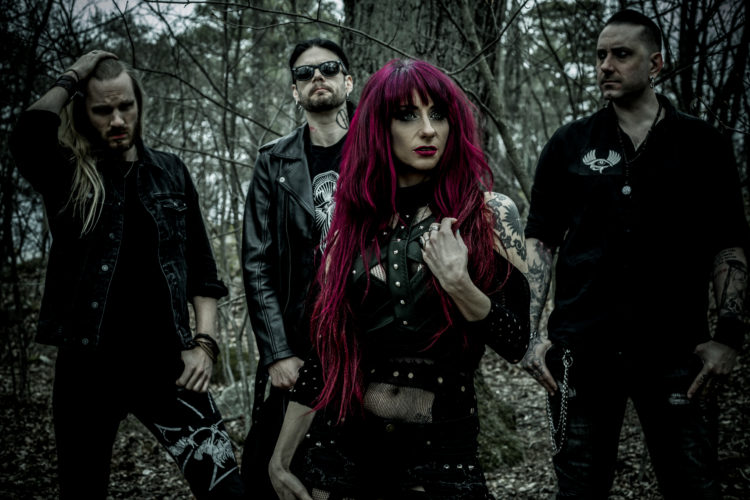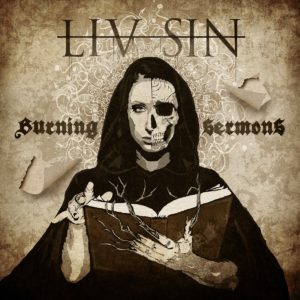
Swedish metal quintet Liv Sin have stormed back into the metal lover’s consciousness with an epically lush, cinematic and devilishly melodic new album, Burning Sermons, a collection of songs that is sure to please the most discriminating of fans with its mix of crunching chords, razor sharp riffs, big beefy bottom end, highlighted by the dominating vocal prowess and presence of band founder and frontwoman, Liv Jagrell.
It is a comprehensive blending of the best of metal’s past, with current production and compositional sensibilities, and a nod to ghost of metal future, pulled together seamlessly by producer Emil Nodtveidt at Stockholm’s Black Syndicate Studio. Burning Sermons was released worldwide in September through Despotz Records.
Liv Sin was born out of the ashes of Jagrell’s previous band, Sister Sin, which toured the world and released a host of critically acclaimed albums from its inception in 2002 until exhaustion and disinterest brought the group to an end. Still full of creative energy and a desire to keep composing, recording and performing compelling modern metal music, Jagrell, her drummer boyfriend Per Bjevoluk and long-time pal, guitarist/songwriter Patrick Ankermark formed the nucleus of Liv Sin, later adding second guitarist Chris Bertzell and bassist Tomie Winter, after the release of their debut album Follow Me which came out in 2017.
It was not easy to leave a band that was essentially her full time job and surrogate family, but Jagrell said she can already feel the members of Liv Sin truly bonding together not just as bandmates, but as friends on and off the stage.
“I would say it’s important to have chemistry between band members, but I also know that it’s really hard to find. When you are looking for musicians it’s always hard to find the best players that would suit the music, and that is really rare. I really felt we had that in Sister Sin: we really had the feeling of being a family, and I do miss that. When I started this new band, I understood that it takes time to get that kind of feeling into a band, and also, it’s hard to find those people who will kind of be like brothers. I saw the guys in Sister Sin as my brothers,” she said, from her studio in Stockholm.
“It’s too early for me to tell if that’s happening in this band. Some of the guys in Liv Sin were my friends before, but I had to try and find other people, and it takes to time get to know each other. So, you go on tour and you learn a little bit more about each other and so on. I think not doing that is one of the reasons bands break up. One big reason is because of the industry – it’s a hard industry. And even if you’re really dedicated it can be really tough and sometimes you just say, ‘okay, that’s enough,’ Which is what the guys in Sister Sin did. And again, it’s hard to find people that match you, of course, and that is also why bands often break up. I think that most of the bands that are able to be together for like 20 or 30 years started maybe when they were very young, like teenagers, where they started playing in their basement or rehearsal room and created that special bond.”

Jagrell has a voice that commands the attention of all who hear it. As opposed to the trend in European metal, she is not of the symphonic/operatic metal school, but nor is she of the guttural/screaming school. Instead she could be said to be more like a bluesy, melodic, gritty, 1970s vocalist – almost as if you combined a female Rod Stewart with a female Lemmy – the best possible sense of the comparison. As the lyric writer for the band, and the person who composes the majority of the melodies, her vocal performances are highlights of every track, where she can be both bombastic and evocative at the same time, inhabiting every word, every phrase with emotional intensity and spiritual sincerity.
Combine this with the riffs concocted by the talented Ankermark and you have music that appeals to classic metal fans, but with a sensibility and sonic production methodology that is exceptionally modern. Even since their previous album, Jagrell believes Liv Sin has evolved as a band.
“We tried to develop the sound on this album from the first one and take it to another level by bringing in Emil from Deathstars as producer and putting in the keyboard and electronic element because I wanted to change it up and change the feeling of the music. And we definitely got that for this album. And instead of me just basing my vocal melodies and vocal lines on the guitar riffs, I found having the keyboards in there gave me different ways of doing the melodies. I have based a lot of my vocals on this album on the keyboards instead of just the guitar, which I think make the whole album more melodic and better overall,” she said.
“And we also recorded this album differently than the first album. We did it in bits and pieces over a longer period of time. We started in early 2018, but then we did a bunch of shows, and then the summer came, and, in the end, we ended up doing almost all the songs again like over three months. In all, I would say we worked maybe half a year on the songs before we went into the studio, which was almost exactly a year ago.
“Instead of doing like two or three weeks completely in the studio full time in a row, we decided that since the studio is in the same town that we are in, Stockholm, we would go into it for smaller sessions over a longer period of time, bit by bit, which I think was a good idea because we could take some breaks, play some of the songs at shows and then come back to them. It enabled us to have more time to really work through the songs and come back to them and work closer with the producer, instead of having strict time limits where you had to be done everything in, like, three weeks.”
There is a darkness to the tone and lyrical content of Burning Sermons, but it is tempered with an overall message of hopefulness against the slings and arrows of a harsh world.
“I hope to get through to people some kind of positive feeling even though some of the songs might not sound very positive on the surface. If I had an overall theme for the album, I think it would be that it is quite hard to live in this world, and I am not fond of everything that is happening in this world, but I still want people to not lose hope. I still want people to stand up for their values and ideals and to get through it. On Hope Begins to Fade, my rhythm guitarist Patrick [Ankermark], who is the one who writes most of the songs, he wanted to do a song like Metallica’s Sad But True – a really moody and groovy song, and that is what he came up with. I heard it and knew there was a really heavy groove and it needed a heavy subject that would suit it well. I remember just hearing in my head when he played the riff the first time the words ‘hope begins to fade.’ And I know that’s what I was going to write about,” Jagrell explained.
 “And, again, I know the lyrics are not the most positive ones, but in the song I tried to tell people to see it like everybody has moments in their life where they truly feel that they have no hope, that hope begins to fade and you have to experience those feelings sometime. You have to allow yourself to feel this despair and feel hopeless and then you can bring yourself back up again. So, the song is about when you are right in the middle of that period of despair and darkness, and we all get to the point where we are like, f*** this, f*** it. It’s about when you feel like you have nothing left, although deep, deep down you do now there is still a fire burning and that’s when you start to bring yourself back up. And I think Emil did a great job making that song sound epic. He came up with the orchestral arrangement that I think took the song higher and made it stronger and more powerful.”
“And, again, I know the lyrics are not the most positive ones, but in the song I tried to tell people to see it like everybody has moments in their life where they truly feel that they have no hope, that hope begins to fade and you have to experience those feelings sometime. You have to allow yourself to feel this despair and feel hopeless and then you can bring yourself back up again. So, the song is about when you are right in the middle of that period of despair and darkness, and we all get to the point where we are like, f*** this, f*** it. It’s about when you feel like you have nothing left, although deep, deep down you do now there is still a fire burning and that’s when you start to bring yourself back up. And I think Emil did a great job making that song sound epic. He came up with the orchestral arrangement that I think took the song higher and made it stronger and more powerful.”
Of a similar note, although a little further down the recovering from despair moment is the incendiary song At The Gates of the Abyss, which is less melancholic and more like an anthem of survival.
“I wanted to do a song for people who feel like they are on verge or on the edge of just falling down and giving up. But then, when you get right to the edge you stop and say, ‘not today.’ And we look around and see ourselves and we can see all the other people standing there and encourage them also to say, ‘no, not today,’ and look at one another and turn around and keep fighting,” Jagrell said, adding that Chapter of the Witch is directed at women, encouraging them to realize their own power and strength and perseverance, and that the world needs more gender equality and a change in gender roles.
“It was the first song that I wrote lyrics for on this album. It came in the middle of the #MeToo thing as well, which was the biggest thing happening in the world at the time. And because I am a woman of course, I have sometimes felt that we badly need a change. So Chapter of the Witch is not like I am meaning a real witch, it’s a metaphor that hopefully we are entering an era where things could be more balanced between men and women, where the female power can become stronger and maybe even take over for a little while to bring some balance back. It’s a call to action for strong, independent women to stand up and be themselves. I also just thought Chapter of the Witch was a cool phrase and I actually came up with the title first, which was such a cool title that I challenged myself to write something to go along with it.”
Ultimately, Jagrell wants those who truly immerse themselves into the albums music and lyrics to strive for better in this world, to focus on things that enliven the spirit and soul, as opposed to drag them down into the gutter of isolation, reliance on technology, materialism and unbridled consumerism.
“That’s kind of the main message in the song Death Gives Life Meaning because it’s true, death does give life meaning. Without death, life would not have the same meaning if we were to live endlessly. But we don’t, so we have to think about the time that we are actually here and make the most of it. And the lyrics are saying that I am seeing so many people just wasting their lives on material things, thinking they will be able to buy happiness, but ultimately, they can’t do it. The more stuff they get, the less happy they really are,” she opined.
“I don’t want to be a part of that. I think maybe it’s because I am older and have grown so much and see so much in my life that I don’t want to be a part of that kind of consumption culture and materialistic world. I want to know people, I want to connect in a real way, I want to be in nature and feel things for real.”
As for touring plans, Jagrell said Liv Sin has a smattering of dates throughout Europe leading into the Christmas season, and plans are being made for both tours and festival appearances for 2020 at present. For more information on the band, Burning Sermons and forthcoming tour dates, visit https://www.livsinofficial.com.
- Jim Barber is a veteran award-winning journalist and author based in Napanee, ON, who has been writing about music and musicians for a quarter of a century. Besides his journalistic endeavours, he now works as a communications and marketing specialist. Contact him at jimbarberwritingservices@gmail.com.
SHARE THIS POST:
